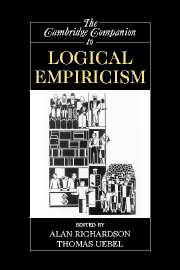37 results
Chapter 6 - On Quine’s Epistemological Objection to Carnap’s Analyticity
- from Part II - Naturalism and Method
-
-
- Book:
- Interpreting Carnap
- Published online:
- 01 February 2024
- Print publication:
- 08 February 2024, pp 106-126
-
- Chapter
- Export citation
Chapter 2 - On Quine’s Guess about Neurath’s Influence on Carnap’s Aufbau
- from Part I - Carnap, Quine, and Logical Empiricism
-
-
- Book:
- The Philosophical Project of Carnap and Quine
- Published online:
- 18 February 2023
- Print publication:
- 23 February 2023, pp 32-51
-
- Chapter
- Export citation
5 - Ernst Mach’s Enlightenment Pragmatism
-
-
- Book:
- Interpreting Mach
- Published online:
- 05 March 2021
- Print publication:
- 18 March 2021, pp 84-102
-
- Chapter
- Export citation
7 - Between Frankfurt and Vienna
- from Part II - Science, Agency and the Future
-
-
- Book:
- Nature, Action and the Future
- Published online:
- 12 January 2018
- Print publication:
- 25 January 2018, pp 133-156
-
- Chapter
- Export citation
Contributors
-
-
- Book:
- The Cambridge Dictionary of Philosophy
- Published online:
- 05 August 2015
- Print publication:
- 27 April 2015, pp ix-xxx
-
- Chapter
- Export citation
7 - Carnap and the Vienna Circle: rational reconstructionism refined
-
-
- Book:
- The Cambridge Companion to Carnap
- Published online:
- 28 April 2008
- Print publication:
- 20 December 2007, pp 153-175
-
- Chapter
- Export citation
Part IV - Logical Empiricism and its Critics
-
- Book:
- The Cambridge Companion to Logical Empiricism
- Published online:
- 28 January 2008
- Print publication:
- 03 September 2007, pp -
-
- Chapter
- Export citation
Part I - The Historical Context of Logical Empiricism
-
- Book:
- The Cambridge Companion to Logical Empiricism
- Published online:
- 28 January 2008
- Print publication:
- 03 September 2007, pp -
-
- Chapter
- Export citation
Series List
-
- Book:
- The Cambridge Companion to Logical Empiricism
- Published online:
- 28 January 2008
- Print publication:
- 03 September 2007, pp 431-432
-
- Chapter
- Export citation
Index
-
- Book:
- The Cambridge Companion to Logical Empiricism
- Published online:
- 28 January 2008
- Print publication:
- 03 September 2007, pp 419-430
-
- Chapter
- Export citation
Frontmatter
-
- Book:
- The Cambridge Companion to Logical Empiricism
- Published online:
- 28 January 2008
- Print publication:
- 03 September 2007, pp i-xiv
-
- Chapter
- Export citation
Bibliography
-
- Book:
- The Cambridge Companion to Logical Empiricism
- Published online:
- 28 January 2008
- Print publication:
- 03 September 2007, pp 371-418
-
- Chapter
- Export citation
Introduction
-
-
- Book:
- The Cambridge Companion to Logical Empiricism
- Published online:
- 28 January 2008
- Print publication:
- 03 September 2007, pp 1-10
-
- Chapter
- Export citation
Part III - Logical Empiricism and the Philosophy of the Special Sciences
-
- Book:
- The Cambridge Companion to Logical Empiricism
- Published online:
- 28 January 2008
- Print publication:
- 03 September 2007, pp -
-
- Chapter
- Export citation
Part II - Logical Empiricism: Issues in General Philosophy of Science
-
- Book:
- The Cambridge Companion to Logical Empiricism
- Published online:
- 28 January 2008
- Print publication:
- 03 September 2007, pp -
-
- Chapter
- Export citation

The Cambridge Companion to Logical Empiricism
-
- Published online:
- 28 January 2008
- Print publication:
- 03 September 2007
10 - Philosophy of Social Science in Early Logical Empiricism: The Case of Radical Physicalism
- from Part III - Logical Empiricism and the Philosophy of the Special Sciences
-
-
- Book:
- The Cambridge Companion to Logical Empiricism
- Published online:
- 28 January 2008
- Print publication:
- 03 September 2007, pp 250-277
-
- Chapter
- Export citation
6 - Rudolf Carnap: The Logical Structure of the World
-
-
- Book:
- Central Works of Philosophy
- Published by:
- Acumen Publishing
- Published online:
- 05 February 2013
- Print publication:
- 31 December 2005, pp 111-133
-
- Chapter
- Export citation
Friedrich Stadler (ed.), The Vienna Circle and Logical Empiricism: Re-evaluation and Future Perspectives. Dordrecht: Kluwer Academic Press (2003), 448 pp., $163 (cloth). - Thomas Bonk (ed.), Language, Truth and Knowledge: Contribution to the Philosophy of Rudolf Carnap. Dordrect, Kluwer Academic Press (2003), 216 pp., $89.95 (cloth).
-
- Journal:
- Philosophy of Science / Volume 72 / Issue 4 / October 2005
- Published online by Cambridge University Press:
- 01 January 2022, pp. 637-642
- Print publication:
- October 2005
-
- Article
- Export citation
Logical Empiricism and the Sociology of Knowledge: The Case of Neurath and Frank
-
- Journal:
- Philosophy of Science / Volume 67 / Issue S3 / 2000
- Published online by Cambridge University Press:
- 01 April 2022, pp. S138-S150
- Print publication:
- 2000
-
- Article
- Export citation



